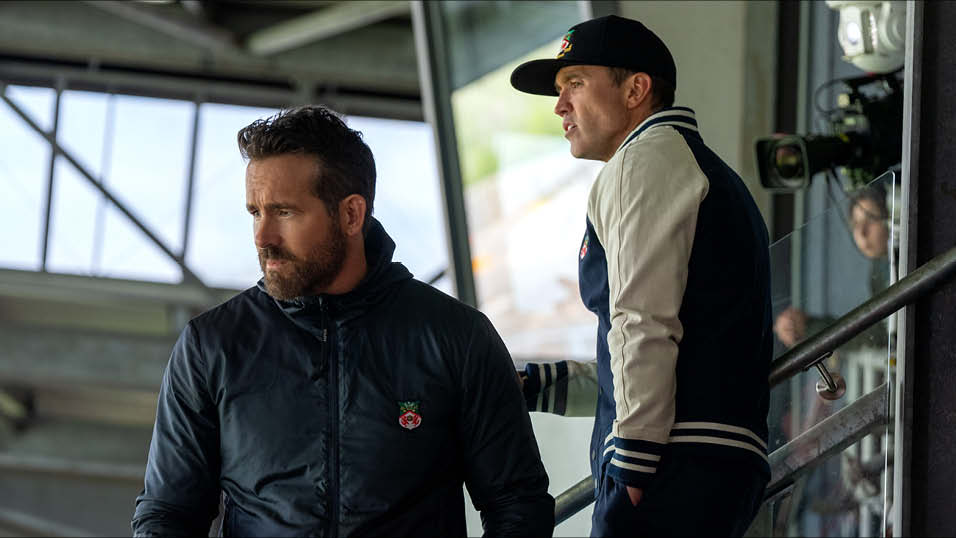Televisual’s exclusive annual report into the TV indie sector, the Production 100, is out now with Avalon in the number one spot once again.
Avalon posted a turnover figure of £274m. The top 100 indies collectively turned over £3.1bn over the past year
72 Films was voted the producers’ producer in the report’s annual Peer Poll in which indies vote for the rivals they most admire.
The survey also asked respondents to rate their broadcaster clients. The BBC was voted as the best broadcaster to work with and Netflix the best streamer.
All3media International took the crown as the indies’ best rated distributor.
Below is the introduction to the survey. The full 53 page report is out now in the Autumn issue of Televisual Magazine.
2023 has turned out to be a harder year than anyone expected. Few would have predicted the buffeting that the TV production sector has had over the past months.
Last year’s Production 100 saw a sector smelling of roses, with a post pandemic boom driving more commissions than ever, both national and international.
That has been part of the current problem. With order books full, broadcasters and streamers needed a following wind to sustain demand for more shows.
Instead, the opposite has happened. The macro-economic situation has led to a fall in advertiser revenue, while rising interest rates have put pressure on borrowings and worsened the cost-of-living crisis.
The Production 100, being based on annual turnover, reflects the revenues coming in on the back of recent boom times. The statistics are healthy, glowing in fact. And there are those with full order books, especially drama indies and natural history specialists, with lead times on projects that are carrying them through 2023 and beyond. But most have already felt the cold hand of reduced commissioning.
Indies are, by and large, manned by positive thinkers. For most, they pitch their outlook on the bright side, certainly politely hopeful. “Cautiously optimistic” was the most popular phrase, used by at least eight indies, including Baby Cow and Dragonfly. The outlook for the UK production sector was less determinedly cheerful. Shine opted for “very tough,” Woodcut chose “rocky” and Whitworth said, “not brilliant.”
Back2back sums up the fighting spirit. “There will be a sea change, but nothing transformational.” Like others, it predicts the failure of some smaller indies. “Middle ranking indies like back2back will do what they have always done which is fight on without any backing or support. Bring it on.”
The UK production market has got used to strong interest from international platforms. The most recent Pact census – for 2022 – shows primary international commissions almost doubled to a new high of £1,320 million.
But in 2023, UK indies have been on the receiving end of streamer turmoil. The market has seen an intense increase in competition, a fall-off in subscribers and a dip in investor confidence, especially where companies are carrying large levels of debt. International media giants are looking for billions in savings.
Against this, commissioning hasn’t stopped, just slowed right down. In the UK, there’s the bulwark of the BBC. Its budgets are eroding, but it is still a stronghold of investment. The threat of Channel 4 privatisation has lifted. Tax credits in the UK have been renewed and extended. And the pound is still alluringly weak against the dollar, for US customers.
Development has been a watchword. Cornelia Street “invested a lot of time and money into development and this is now paying dividends in terms of broadcaster interest.” Others reporting a doubling down on development, include Curious Films and Interstellar.
Squeezing a profit is a major challenge. The recent production boom has fuelled wage inflation, while budgets stagnate and production values are expected to stay high. This and other challenges and solutions will be explored in more detail across the following pages, including the impact on the workforce.
Of course, every challenging situation demands the hunt for a solution. “The pace of change is high and we have to work hard to stay competitive,” says Aurora.
Off the Fence saw its highest output to date over the last year. But it’s now relying on its commercial grey cells. “There’s immense strain on the industry…. We are having to rethink ways of bringing money to the table.” And Wag says, “Everyone wants to explore new ways of getting content on air, and that involves considering new relationships and deal models.”
Remarkable and Monkey make the observation that demand for low cost and premium programmes is more stable. DSP is one that sees demand for lower cost, higher volume series in the factual space.
And the familiar is naturally higher up the agenda: talent-led ideas and franchises. Those with returning series are insulated from the downturn. “Small and middle-sized indies that don’t have returnable brands are really suffering,” says one Production 100 respondent.
As ever, there’s confidence that the best ideas will find a home. “It’s clear that this year and next are going to be the most challenging in some time,” says Element. “But we’re finding the right projects with exciting talent still find their place on broadcasters’ slates.”
The top 100
The turnover of the top 100 indies totals £3.1bn, up from last year’s £2.5bn, a 24 per cent increase. A year earlier, taking stock during the pandemic, it was £1.9bn.
These figures reflect a bumper year in 2022, as platforms refilled their production shelves coming out of Covid.
Scoring a hat trick, Avalon is the top ranked production company for the third year running. The turnover of the talent management and distribution leader took another hike, from £260m in last year’s survey, to £274m this time around. The indie behind Breeders, Starstruck, Taskmaster and now Junior Taskmaster, had 38 productions across 23 buyers and scored three Emmys for Last Week Tonight with John Oliver.
Drama powerhouse Left Bank, producer of Who Is Erin Carter?, Three Pines and Without Sin, came in second, with a turnover of £224m, a considerable climb since last year when it just made it into the top 20.
With two new entrants into the Production 100 going straight into the top ten, significantly higher revenues were required to head up the survey. Objective Media Group, with its mix of factual, entertainment and drama labels, moved up the table from twelfth to third, with a turnover just shy of £104m, almost double last year.
Pulse, in fourth place with over £102m in revenues, also represents a near doubling of last year’s turnover, keeping it in the top 10. Coming in seventh is Bad Wolf, the indie behind I Hate Suzie Too and Industry, which added over £30m to its turnover.
Two more drama indies projected into the top 10, adding around £60m to each of their turnovers. The maker of SAS Rogue Heroes and The Rig, Kudos came in at number six. While Sister, with titles including Better and Gangs of London on its slate, is at number eight.
Newcomers to the Production 100 – event specialist Done + Dusted and Fulwell 73 – took their places, at ninth and tenth.
There are a slew of indies in this year’s Production 100 that are either new or returned-after-an-absence. New and returning indies that are part of a group are Baby Cow, Blast! Films, Electric Robin, Sid Gentle, Story Films, The Comedy Unit, Transistor, True to Nature and Workerbee.
Whilst new and returning true indies include 3DD, APC, Big Circus, Big Wave, Cake, CC Lab, Chalkboard and Clapperboard, Cwmni Da Cyf,Done + Dusted, First Look, Fulwell 73, Noah Media, Seventh Art, South Shore, The ATS Team, Moonage, Triforce and Two Rivers.
Congratulations to all of these. It’s no mean feat to be in the ranking. The cut-off point is £3.2m and the median turnover is £15.2m.
It’s important to note that the Production 100 doesn’t represent the complete UK indie sector. Several well-known companies can’t take part, as they are part of publicly listed companies that don’t break out individual turnover figures. These include The Garden, Big Talk, Plimsoll and Mammoth Screen (all part of ITV Studios) and Wall to Wall and Ricochet (part of Warner Bros Television Studios UK.) However, we’re confident that the Production 100 represents the lion’s share of UK production.
It’s also important to say that we take account of all submitted forms. Where an indie doesn’t make the ranking, we consider its comments and votes towards the rankings that feature in later pages.
UK and international
The domestic market is front and centre for the UK indie sector. Just under half of an average indie’s revenues come from UK commissions.
APC Studios, Cactus and Big Circus are three that work only with UK commissioners, while others, including Expectation, Roughcut, Mindhouse and Moonage say that most of their work is with UK customers. Most of Banijay’s UK indies are UK-focused, including Remarkable, Dragonfly and Tiger Aspect.
Some manage a fairly even split between UK and international funding. These include Minnow, The ATS Team, Zig Zag, Woodcut and Objective Media Group.
For this year’s reporting period, international streamers and networks represented almost one third of an indie’s turnover, a number that has been steadily climbing. And many are still looking to international business for growth opportunities.
There are quite a few for whom international funding underpins the biggest part of their slate, such as Endor, Impossible Factual, Merman, October and Nutopia.
Merman is looking for increased opportunities with streamers, “UK broadcaster slots are reduced and in high demand.” Impossible Factual agrees: “by being internationally focused, we are able to manage risk by tapping a wider range of potential funders.”
At Done+Dusted, 80 per cent of its revenue is from international custom: “We will always want to work in the UK, but the opportunities are more clear in the US and Middle East.”
However, the survey also throws up widespread concerns about the state of the streamers. Blink talks about “the tumultuous journey that the US streamers have been on in the last 12 months.”
The merger of Warner Bros and Discovery in 2022, involving around $50bn of debt, and subsequent doubts in the financial markets, has led to the company reportedly looking for up to US $5bn in cost savings. There’s currently a review of UK commissioning at Discovery. Disney has also been looking for US$5.5bn in savings, cutting 7,000 jobs. While Paramount in the US is reducing its domestic team, after it reported losses in the first quarter of the year.
Aware of this landscape, there are also plenty who are looking to the UK for any growth opportunities. There are those that have largely foregone IP in return for fee-based international work and are interested in building more rights revenue into their business.
And while the UK market isn’t healthy, the impact of money worries at the streamers and US platforms has also led to a commissioning slow-down. Nutopia observes “constrained streamer commissions due to uncertain subscription levels and reduced budget tariffs.” While October, where the majority of its funding is international, says “market volatility has been more acute than ever…. The greatest challenge is to sustain a diversity of funding and genres.”
Another big challenge has been sustaining the TV and film workforce. This is one of the biggest concerns of indies in this year’s Production 100 Survey.
Cornelia Street comments that “for so many freelancers struggling to get work, it’s been horrible.” Wonderhood says: “more talent will leave the industry with freelancers out of work.” Something that a recent survey by trade union Bectu confirms, with three quarters of survey respondents not working and many leaving, or considering leaving, the industry.
Remarkable sums up the balancing act for indies, “juggling the uncertainty of commissions and recommissions whilst keeping regular freelancers and permanent staff financially supported.”
In some genres, there’s still a talent shortage. Silverback lists one of its challenges as retaining staff, with “a lack of talent in the Natural History genre.”
The fall-out from Brexit continues. At Blink Industries, they reference “the effect of Brexit on highly skilled European talent.”
For drama producers, concerns around the workforce have been front and centre now for months, with the Writer’s Guild of America strikes impacting production in the UK and reducing opportunities for crew to work.
Agreement on working hours and pay for drama crew in the UK at the end of last year has been a steadying factor. “Renegotiation of the PACT/BECTU agreement…seems to have simplified production and will be positive as long as broadcasters recognise the need to bring budgets into line with the new agreement,” says one Production 100 respondent, “but it has been a bumpy ride to get there.”
Wage inflation and inflation generally, along with static, or falling, budgets, has caused a resource crisis. Answering about challenges, Cornelia Street says, “cashflow, cashflow, cashflow. A rise in crew and production rates is not reflected in broadcaster budgets.”
And at Endor: “Funding has not increased to take into account the rapid rise in production costs… which results in a discrepancy between production budgets and funding available.”
Some comment on the other side of the coin, with the current market putting a lid on wage inflation, bringing about “a reduction in the ever-spiralling cost of talent.”
Commissioning decisions are taking longer and can be mercurial. Risk taking on projects is only for the very few. The end to the government Film and TV Production Restart Scheme has been an added deterrent to risk.
Big Wave describes business as “hard to win and slow to contract.” Many report decisions from broadcasters taking longer and some describe changes of mind and downward changes of budget, even after handshakes have happened. Expectation names broadcaster cashflow, late payments and tight budgets as being of chief concern.
One area where there are concerns that recent gains will be lost, is in inclusion, diversity and welfare. While the industry has made strides to make cast and crew more diverse and to address issues including mental health, there are costs underlying these changes. Several indies list work with under-represented groups and improving working conditions in their year’s highlights. Optomen is not the only one who sees “maintaining high quality and high welfare standards, despite decreasing budgets” as a goal.
Tiger Aspect which delivered Lenny Henry drama Three Little Birds to ITV earlier this year, says, “regionality and diversity goals are becoming increasingly difficult to deliver.” There are similar concerns about maintaining the drive to more sustainable production.
Most accept that to find a healthy production budget, financing now includes advance sales and deficit-funding for many projects.
Streamers are increasingly open to sharing rights around co-production. Fulwell 73 cites a “renewed importance of co-production deals where production companies can retain rights.” Electric Robin adds that streamers are looking for ad funding.
Chalkboard and Clapperboard say that while they have managed to make premium drama that commands high viewing figures, at considerably less than the market price, “the current economic climate offers huge challenges for our model. Producers are left to carry the burden of risk or to overspend, and we only managed to make it work via producing a high volume of sales.”
In March of 2023, the government announced that it would continue with tax credits, remodelled as expenditure credits. It also raised the levels, to 34% for film and high-end TV, plus video games, and to 39 per cent for the animation and children’s TV sectors. Animation companies in the Production 100 welcome this move.
While tax credits have been a huge support for premium programming, at the other end of the scale – where there is increased demand for low budget shows – there is no tax relief. Raw “anticipates the requirement and appetite for lower cost programming/lower volumes to grow outside of those unable to take advantage of the HETV tax credits.”
Despite the challenges, producers remain resilient. Like a Shot is “optimistic about the ability to adapt to a changing landscape and find new opportunities.” Fulwell 73 looks further ahead and “expects long term demand for content to be strong, while in the medium term there will be a continued slow-down in production as the industry adjusts to the new economic realities.”
Some predict a major readjustment in an industry that has grown and flourished over the last few years. Collective says “the industry as a whole, internationally, is in for a seismic shift.”
Short term, the general outlook is that commissioning levels will soon climb, at least a little. A Productions says, “we are seeing signs that this will start moving again in Q4 of 2023 and into 2024.” Bandicoot in Scotland is beginning to see commissioning open up again. Naked looks forward to “an increased appetite to buy in 2024.”
With all the good work on development that has been happening, producers will be ready. As Sandpaper puts it, there are “fires to rekindle when broadcaster finance allows.”
Jon Creamer
Share this story






























